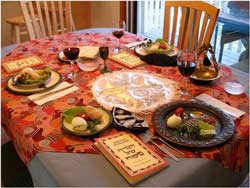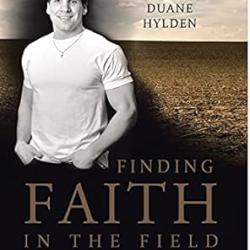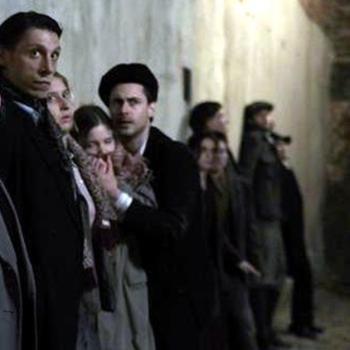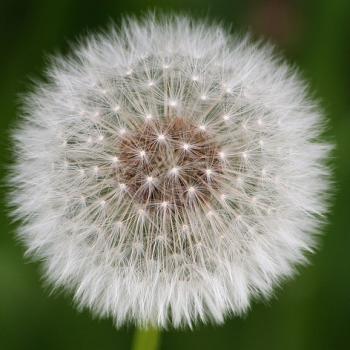Talia: So basically, we can't have chometz, we have to eat matzah, and talk about the exodus from Egypt. Well, let's talk about chometz. What does that mean? Basically, it's anything with leavening. That seems like an easy designation when you talk about cookies and bread but then when we break it down further it gets complicated, including any grain that can be fermented or has been mixed with any liquid.
- Anything made of wheat
- Rye
- Barley
- Oats
- Spelt
- And if you are Ashkenazic (aka Eastern European) -- kitniyot, which equals rice, beans, corn, peanuts, other legumes
Reb Bahir: But what do we do on Pesach, Talia?
Talia: Another miracle of Pesach, we become Sephardi (aka Spanish Jews)! We decided not to follow the custom of kitniyot. But let's get back to the Seder. We have some great background information here.
So, you've been invited to a Seder. Chances are, they didn't ask you to bring anything to eat. Flowers are always a nice hostess gift, especially on Passover. Refrain from buying wine unless they tell you exactly what to get. Better safe than sorry because if you bring something with chometz in/on it into a kosher home, you will de-kosher-ize the house! If your host does welcome food, be sure you don't use any bread or grain products in the dish.
Now, tatti, what can they expect from the actual meal?
 Reb Bahir: Well, the word Seder (pronounced say-der) actually means order and this meal is very ordered. Here is a fun mnemonic to remember the order:
Reb Bahir: Well, the word Seder (pronounced say-der) actually means order and this meal is very ordered. Here is a fun mnemonic to remember the order:
KoUKY Mr M&M's May Kome Schlepping after Tzilly Boys Holding Noses - the capital letters correspond with a Hebrew word below. (With normal spelling, it would say "Kooky Mr. M&M's may come schlepping after silly boys holding noses." Doesn't make a whole lot of sense but you won't forget it!)
- Kadesh (1st glass of wine)
- Ur'chatz (wash hands, no blessing)
- Karpas (eat greens -- parsley)
- Yachatz (break the middle matzah)
- Magid (tell stories)
- Rohtzah (wash hands, with blessing)
- Motzi (say the blessing over bread, but don't eat)
- Matzah (say the blessing over the matzah, now eat it)
- Maror (say the blessing, eat the bitter herbs... eyes water)
- Korech* (no blessing, just make a sandwich of matzah and maror and maybe some sweet charoset... if you aren't a purist)
- Shulchan Orech (eat the meal... finally)
- Tzafun (find the afikomen... a piece of matzah disappeared during the meal and the kids have to find it. We can almost guarantee that it isn't in the box of matzah... trust us, we've both tried that trick.)
- Bayrech (blessing after the meal)
- Hallel (singing songs and saying psalms of praise)
- Nirtzah (we all say "L'shanah haba'ah b'Yerushalayim!" "Next year in Jerusalem")
The End! *By the way, this sandwich pre-dates the Earl of Sandwich by 3000 years...
Talia: Wait a second now... I think you have left out a couple... actually three important items. I only see one glass of wine on there.
Reb Bahir: Yes, we drink the second glass of wine after the maggid, the story. The third glass comes after saying the bayrech, the grace after meals along with opening the door for Elijah the prophet and pouring him a glass of wine. The last glass is after hallel.
Talia: Great. So that's the Seder in a nutshell. I imagine our FOT's out there (FOT=Friends Of the Tribe) are wondering what might be required of them during this whole event. Well, four glasses of wine, ask questions, and enjoy. One thing you should know... a Seder is an interactive meal/service. We all read out loud together and sing and talk and tell stories. Participation rarely goes amiss!
Your host or hostess will not fault you for asking questions, so if we haven't answered them here, give them a call or post a comment and we will respond!
Talia Davis is the daughter, granddaughter, and great-granddaughter of rabbis. She directs the Jewish Portal at Patheos and manages the site's online community.
Rabbi Bahir Davis is a Maggid (storyteller) in the best tradition of Jewish storytelling and is known for his vibrant humor and imagery. He refuses to be connected with any one movement, preferring to serve the entire spectrum of the Jewish community and is the spiritual leader of Rocky Mountain Hai based in Lafayette, Colorado, as well as a frequent contributor to Patheos.




